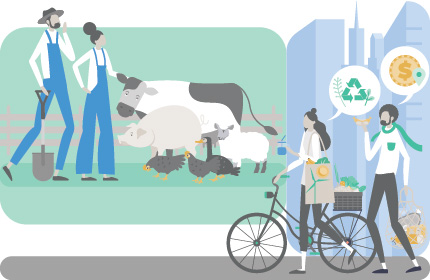Animal Protein Production: Advances on Bridging the Gap Between Producers and Consumers and a Dialogue on Policy Implications
-

May 19, 2025
9:30 am - 2:15 pmWashington, DC, USA
This by-invitation-only workshop explored the complexities and tradeoffs faced by meat producers and consumers. The half-day event was hosted by a team of researchers, industry professionals, and other food systems experts from across the nation currently working at this important intersection of topics. This workshop was a joint effort between the Agriculture and Food Systems Institute (AFSI), the University of Washington (UW)–Food Systems, Nutrition, and Health program, the Washington State University (WSU) Food Systems program, and the University of Minnesota Institute on the Environment. It was part of a research project funded by the United States Department of Agriculture National Institute of Food and Agriculture (USDA NIFA) and supported by the time and expertise of a number of outside professionals and experts from related industries.
The interactive seminar included:
- Presentations by workshop organizers containing background information and relevant research findings.
- Expert-led talks about the current state of trust between producers and consumers, future outlooks, and policy-relevant takeaways.
- Panel discussions exploring animal agriculture, economic and ecological sustainability, and associated policy landscapes.
- Breakout group activities focused on unpacking policy implications and futurecasting.

Agenda
9:30 am
Registration
Arrival and check-in. Pastries and coffee served.
Session I: Current Context
10:00 am
Introduction to the Workshop
Dr. Andrew Roberts, Chief Executive Officer, Agriculture and Food Systems Institute (AFSI)
10:05 am
Animal Production and Sustainability: Goals and Challenges
Mr. Eric Mittenthal, Chief Strategy Officer, Meat Institute
10:20 am
Consumer Perceptions and Decision-Making for Animal Protein Products
Dr. Tamika Sims, Senior Director – Member & Partner Engagement, International Food Information Council
10:35 am
Break
Session II: Advancing Trust Between Producers and Consumers
10:40 am
How Are Producers Thinking About Livestock Sustainability?
Dr. Sarah Collier, Assistant Professor, Food Systems, Nutrition, and Health Program, School of Public Health, University of Washington
11:05 am
How Do We Know What We Know About Consumer Attitudes Towards Meat Sustainability?
Dr. Marie Spiker, Assistant Professor, Food Systems, Nutrition, and Health Program, School of Public Health, University of Washington
11:15 am
Deliberative Polling: Are There Ways We Can Help Move Consumers Towards Trust?
Dr. Jennifer Otten, Professor, Food Systems, Nutrition, and Health Program, School of Public Health, University of Washington
11:25 am
Panel Discussion
Dr. Andrew Roberts (moderator) and Session Speakers
12:10 pm
Lunch Served
Session III: Policy Implications and Looking Ahead
1:00 pm
Breakouts and Discussion: Policy Implications and Futurecasting
Dr. Andrew Roberts (facilitator), Speakers, and Participants
2:00 pm
Wrap Up
Dr. Andrew Roberts and Mr. Eric Mittenthal
Speaker Bios
Sarah Collier, Ph.D.
Assistant Professor, Food Systems, Nutrition, and Health Program, School of Public Health, University of Washington
 Dr. Sarah Collier is an Assistant Professor in Environmental and Occupational Health Sciences and core faculty in the Food Systems, Nutrition, and Health Program. She is trained in plant genetics and soil science, and much of her research has focused on agricultural sustainability. She completed her Ph.D. in Plant Breeding at Cornell University, where she was a recipient of both the Munger/Murphy Award and the Barbara McClintock Award. She also received a competitive NSF Graduate Research Fellowship, and an interdisciplinary NSF Science, Engineering, and Education for Sustainability Postdoctoral Fellowship to support her research and outreach related to agricultural climate change mitigation and adaptation at the University of Wisconsin–Madison.
Dr. Sarah Collier is an Assistant Professor in Environmental and Occupational Health Sciences and core faculty in the Food Systems, Nutrition, and Health Program. She is trained in plant genetics and soil science, and much of her research has focused on agricultural sustainability. She completed her Ph.D. in Plant Breeding at Cornell University, where she was a recipient of both the Munger/Murphy Award and the Barbara McClintock Award. She also received a competitive NSF Graduate Research Fellowship, and an interdisciplinary NSF Science, Engineering, and Education for Sustainability Postdoctoral Fellowship to support her research and outreach related to agricultural climate change mitigation and adaptation at the University of Wisconsin–Madison.
Dr. Collier is broadly interested in exploring complexities, trade-offs, and co-benefits associated with food system sustainability and resilience, and the ways in which beneficial changes and adaptations are identified, evaluated, and implemented. Her work spans food production systems, including fruits and vegetables, forages, animal agriculture, and aquaculture, and also examines human decision-making.
Eric Mittenthal
Meat Institute
 Eric Mittenthal is the Chief Strategy Officer at the Meat Institute, previously serving as the organization’s vice president of public affairs and vice president of sustainability. He leads the Meat Institute’s Protein PACT strategy focused on implementing a framework for continuous improvement throughout the industry and a commitment to greater transparency to meet consumer and customer expectations.
Eric Mittenthal is the Chief Strategy Officer at the Meat Institute, previously serving as the organization’s vice president of public affairs and vice president of sustainability. He leads the Meat Institute’s Protein PACT strategy focused on implementing a framework for continuous improvement throughout the industry and a commitment to greater transparency to meet consumer and customer expectations.
Eric joined Meat Institute from the International Food Information Council (IFIC), where he worked closely with food industry communications leaders, led IFIC’s efforts in connecting with journalists and influencers, and launched many of IFIC’s successful social media platforms. Mittenthal moved to Washington D.C. following a career as a television reporter and producer in several markets around the country, including Atlanta, Jacksonville, NC, and Idaho Falls, ID. He graduated from Cornell University in Ithaca, NY, with a B.A. in Psychology and also received an M.S. in Biomedical Sciences from Eastern Virginia Medical School in Norfolk, VA.
Jennifer Otten, Ph.D., R.D.N.
Professor, Food Systems, Nutrition, and Health Program, School of Public Health, University of Washington
 Dr. Jennifer Otten is a Professor and Undergraduate Program Director in the Food Systems, Nutrition, and Health Program, School of Public Health, University of Washington. Dr. Otten’s research uses qualitative and quantitative tools, including policy and program evaluations, to focus on understanding, changing, and evaluating food systems and food systems policies as they relate to public health and nutrition outcomes. Between 1998 and 2006, Dr. Otten served in various capacities for the National Academy of Medicine of the National Academy of Sciences in Washington, DC, including as a study director and as the organization’s first communications director. A registered dietitian, Otten completed her dietetic internship at the Massachusetts General Hospital in Boston, has her bachelor’s degree in nutritional sciences from Texas A&M University, completed a master’s degree in nutrition communication from Tufts University in Boston, and received her doctorate in Animal, Nutrition and Food Sciences from the University of Vermont. She also completed a postdoctoral research fellowship at the Stanford Prevention Research Center in the Stanford University School of Medicine.
Dr. Jennifer Otten is a Professor and Undergraduate Program Director in the Food Systems, Nutrition, and Health Program, School of Public Health, University of Washington. Dr. Otten’s research uses qualitative and quantitative tools, including policy and program evaluations, to focus on understanding, changing, and evaluating food systems and food systems policies as they relate to public health and nutrition outcomes. Between 1998 and 2006, Dr. Otten served in various capacities for the National Academy of Medicine of the National Academy of Sciences in Washington, DC, including as a study director and as the organization’s first communications director. A registered dietitian, Otten completed her dietetic internship at the Massachusetts General Hospital in Boston, has her bachelor’s degree in nutritional sciences from Texas A&M University, completed a master’s degree in nutrition communication from Tufts University in Boston, and received her doctorate in Animal, Nutrition and Food Sciences from the University of Vermont. She also completed a postdoctoral research fellowship at the Stanford Prevention Research Center in the Stanford University School of Medicine.
Andrew Roberts, Ph.D.
Chief Executive Officer, Agriculture & Food Systems Institute (AFSI)
 Dr. Andrew Roberts joined the Agriculture & Food Systems Institute (AFSI) in December 2009 as the Deputy Director of the Center for Environmental Risk Assessment (CERA), where he developed tools and materials for use in training and capacity building related to the problem formulation approach to environmental risk assessment and served as the coordinator for CERA’s capacity building projects under the USAID-funded South Asia Biosafety Program (SABP) and the World Bank-funded Partnership for Biosafety Risk Assessment and Regulation, in Bangladesh, Pakistan, and Vietnam. He also provided technical support for capacity building work in Brazil, India, Japan, Chile, and South Africa. In January 2015, he became the director of CERA, as well as the Center for Safety Assessment of Food and Feed (CSAFF), which worked on food and feed safety assessment for foods derived from genetically engineered plants. The two centers were later consolidated under the Research Foundation, for which he became Deputy Executive Director in January 2017. When the organization became the Agriculture & Food Systems Institute in 2020, his title shifted to Vice President – Biotechnology, and he assumed the role of Chief Executive Officer later that year.
Dr. Andrew Roberts joined the Agriculture & Food Systems Institute (AFSI) in December 2009 as the Deputy Director of the Center for Environmental Risk Assessment (CERA), where he developed tools and materials for use in training and capacity building related to the problem formulation approach to environmental risk assessment and served as the coordinator for CERA’s capacity building projects under the USAID-funded South Asia Biosafety Program (SABP) and the World Bank-funded Partnership for Biosafety Risk Assessment and Regulation, in Bangladesh, Pakistan, and Vietnam. He also provided technical support for capacity building work in Brazil, India, Japan, Chile, and South Africa. In January 2015, he became the director of CERA, as well as the Center for Safety Assessment of Food and Feed (CSAFF), which worked on food and feed safety assessment for foods derived from genetically engineered plants. The two centers were later consolidated under the Research Foundation, for which he became Deputy Executive Director in January 2017. When the organization became the Agriculture & Food Systems Institute in 2020, his title shifted to Vice President – Biotechnology, and he assumed the role of Chief Executive Officer later that year.
Prior to joining AFSI, Dr. Roberts worked at the U.S. Department of Agriculture (USDA) in several different capacities, all related to the regulation of agricultural biotechnology. He began his career at USDA as an AAAS Risk Policy Fellow in the Office of Science of Biotechnology Regulatory Services (BRS), the group responsible for regulating genetically engineered plants at USDA’s Animal Plant Health Inspection Service. After spending a year in the New Technologies office of the Foreign Agricultural Service serving as the lead for USDA’s efforts related to the Cartagena Protocol on Biosafety, he returned to BRS to serve in the International Affairs branch where he remained until joining AFSI.
Tamika Sims, Ph.D.
Senior Director – Member & Partner Engagement, International Food Information Council (IFIC)
 Tamika Sims is a native of Atlanta, Georgia, where she received her B.S. in Biology from Spelman College, M.S. in Biomedical Science (with an emphasis in Microbiology) from Georgia State University, and Ph.D. in Virology and Immunology from Morehouse School of Medicine. Her graduate research focused on HIV pathogenesis, specifically focused on the ability of the HIV protein Nef to cause apoptosis (cell death) among immune system cells.
Tamika Sims is a native of Atlanta, Georgia, where she received her B.S. in Biology from Spelman College, M.S. in Biomedical Science (with an emphasis in Microbiology) from Georgia State University, and Ph.D. in Virology and Immunology from Morehouse School of Medicine. Her graduate research focused on HIV pathogenesis, specifically focused on the ability of the HIV protein Nef to cause apoptosis (cell death) among immune system cells.
Before joining IFIC, Tamika was the Director of Human Health Policy for CropLife America (CLA), where she helped analyze the impact of regulatory initiatives on consumer health and the crop protection industry, including existing and emerging regulations under the Federal Insecticide, Fungicide, and Rodenticide Act; the Clean Water Act; and the Endangered Species Act. Tamika also developed approaches for supporting policies that enabled farmers to access effective crop protection tools, such as through the submission of public comments, discussion with federal agencies, and coordination with CLA member companies.
Before joining CLA, Tamika was the Director of Science and Research for the International Bottled Water Association, where she was the chief staff liaison for the association’s relationships and activities with various scientific, industry, government, and academic organizations and trade associations. She also managed the IBWA Environmental Sustainability Committee, the Packaging Subcommittee, the Virus/Microbial Subcommittee, and IBWA’s Drinking Water Research Foundation.
Previously, at Independent Project Analysis, she performed project management consulting and work process re-organization for major companies in the process industries (including chemicals, pharmaceuticals, and consumer products).
Marie Spiker, Ph.D., R.D.N.
Assistant Professor, Food Systems, Nutrition, and Health Program, School of Public Health, University of Washington
 What would it look like for us to equitably nourish a growing global population? More importantly, how do we get there – which inputs have more leverage within complex systems, and what evidence do decision-makers need in order to support public health? Dr. Marie Spiker approaches public health nutrition research through a food systems lens that recognizes the need for transdisciplinary and multisectoral collaboration.
What would it look like for us to equitably nourish a growing global population? More importantly, how do we get there – which inputs have more leverage within complex systems, and what evidence do decision-makers need in order to support public health? Dr. Marie Spiker approaches public health nutrition research through a food systems lens that recognizes the need for transdisciplinary and multisectoral collaboration.
Dr. Spiker’s research interests include public health nutrition, sustainable food systems, food loss and waste, value chains for nutrition, systems modeling of food supply chains, and capacity building within nutrition and public health. To explore these topics, she draws from training in quantitative and qualitative methods and systems science, as well as her training as a registered dietitian nutritionist. Her professional practice experience includes work with municipal food policy and capacity building within the profession of nutrition and dietetics. She holds a B.A. in Anthropology and B.S. in Public Health from the University of Washington and an M.S. and Ph.D. in Human Nutrition from Johns Hopkins Bloomberg School of Public Health.
